Settings out for Adventure
There was a to-and-fro on Twitter recently about RPG systems and book settings that got me thinking about the idea again. I've often thought about turning Shadows of the Apt into an RPG — it would give it a pleasing circularity, if nothing else, given the world's origins. There are a lot of very good worlds out there that could stand a little adventuring, and so I'm going to highlight a few, starting with the two that Paul Weimar first brought up.
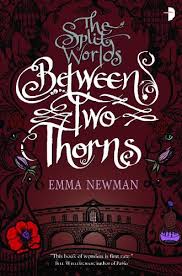 Split Worlds (Between Two Thorns and sequels) — Emma Newman
Split Worlds (Between Two Thorns and sequels) — Emma Newman
I've been effusive in the past about this urban fantasy series, and it has a great deal of potential as a gaming setting. The basic lowdown is that there's the modern world, the faerie world and a kind of in-between where various human families live like Regency aristocracy (and their servants), dominated by the faerie lords and meddling in the real world, policed by a network of unreliable wizards and their minions. Unlike a lot of urban fantasy, it's also a portal fantasy, so the potential landscape for adventures covers everything from our world all the way to the highly disturbing reaches of faerie. There are plenty of "things to be" — a very important thing for any game — as well as the various noble families, the Aribters (wizardly detectives), the mysterious Agency that provides servants for people and a whole liminal magical demimonde of rogues, renegades and traders, there are also other powers with their own agendas who get revealed as the series goes on. Just as in the protagonist, Cathy's, case, there is ample scope for all manner of politics, and personal goals conflicting with the dictates of higher powers, as well as the attraction of the whole "hidden world" — like the best parts of the World of Darkness setting. Split Worlds isn't necessarily action-heavy, but would suit a game of magic, politicking and complex characters.
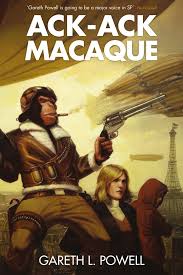 Ack-Ack Macaque and sequels — Gareth Powell
Ack-Ack Macaque and sequels — Gareth Powell
The other series Mr Weimar was talking about was these profoundly action-fuelled books. In short (and in the first volume) gaming icon Ack-Ack, a WWII flying ace monkey at the heart of the world's most beloved game, turns out to be a very real monkey who is sprung, spitting and swearing, into the real world at the heart of a global conspiracy. At first glance it might seem that this was a somewhat more limited forum for play — after all, only one of you can play the monkey, and then what? But although the eponymous primate does dominate the series, the world is extremely rich and full of ideas. In the first book, Ack-Ack gets help from a whole range of characters — cyborgs, AIs, hackers and the crown prince of England(!), and the second book really does blow the doors wide open as far as what you could include in a game (no spoilers but it's pretty damn epic). The setting would demand a game with plenty of gunplay and chases and bonus dice for pithy one-liners, but also one with plenty of secrets, conspiracies and investigation.
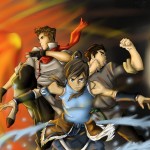 Avatar/Legend of Korra — DiMartino and Konietzko
Avatar/Legend of Korra — DiMartino and Konietzko
Moving on to other settings that are just crying out for a game, I am completely in love with Avatar and its sequel, Legend of Korra. If you haven't seen these, you absolutely should. The standard of writing, animation and world building on display is frankly second to none. The plots themselves are top notch, but they are thrown into sharp relief by one of the best thought-through worlds I've ever had the pleasure of immersing myself in. The "bending" idea is enormously versatile and, unusually for any setting, is exploited to the full by its practitioners — as in my own Shadows of the Apt (if I might venture the hubris of making a comparison) we get to see a lot of familiar real world problems being tackled by a completely different toolkit. The setting also benefits from being extremely diverse, with a number of well-realised cultures. And of course you have the period shift between the two series, so that Avatar gives you something more medieval, while Korra ramps things up to something approximating the 20's.
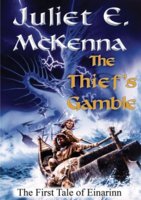 Einarinn (The Thief's Gamble and sequels) — Juliett E Mckenna
Einarinn (The Thief's Gamble and sequels) — Juliett E Mckenna
Juliet's long-running fantasy series is more of a traditional fantasy world, but which has two advantages over many fantasy settings (either written or for RPGs) in that, firstly, it is thought out to a considerable level of detail, and secondly it is all about the realpolitik — no starry-eyed elves frolicking off to the west here. This is a good setting to give you a lot of the fantasy tropes you might be looking for, whilst grounding them in a working world that makes sense politically, economically and magically. Mckenna's character tend to form party-ready groups of adventurers, and the world itself is large and complex, with numerous interdependent nations, a Byzantine wizard's college and plenty of built-in tension to draw plots from. A game set in Einarinn could encompass a wide variety of play styles from global (and magical) politics all the way down to bands of thieves and shysters just trying to make ends meet.
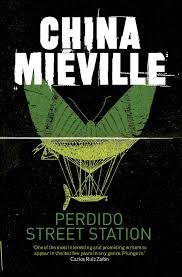 Bas-Lag (Perdido Street Station and sequels) — China Mieville
Bas-Lag (Perdido Street Station and sequels) — China Mieville
Certainly one of the book-worlds I've most heard talked about as an RPG setting is Bas-Lag, setting for the festering industrial hive of New Crobuzon and a great deal more. Mieville tells stories about class, oppression, politics, crime and cosmic horror (and it's telling that the cosmic horror is usually less horrible than the political corruption) and he furnishes his world with a vast wealth of collateral detail that brings the characters and the issues very much to life. The three books of the series take us across geography and through time, presenting scores of cultures and races, factions, secret societies and semi-magical technologies to play with. Think games where the players are pit against a vast and callous system, within a vast and careless cosmos, with only an ear-amputating giant spider to help them…
There have been a fair number of games-of-the-book recently — Butcher's Dresden files, GRRM's Ice and Fire, Stross's Laundry File — and of course GURPS has produced sourcebooks for a number of oher series including Discworld and the Book of the New Sun. As noted, I'd be delighted if a Shadows of the Apt game actually got made some day, or maybe I'll do it myself if I ever have the time. Time, as per usual, is always the problem.
 © 2008-2025 Pan Macmillan
© 2008-2025 Pan Macmillan
Hi Adrian!
There are a ton of worlds that would suit very well for games. (I do think the world of the Kinden is amongst them, too).
Malazan, by Steven Erikson came *out* of a RPG game run by Erikson…and I've, um, borrowed from his world.
The diverse "Three Worlds" of Martha Wells' Raksura is another world I've, um, borrowed from.
On an SF bent, I've love an EXPANSE RPG from the writings of James SA Corey.